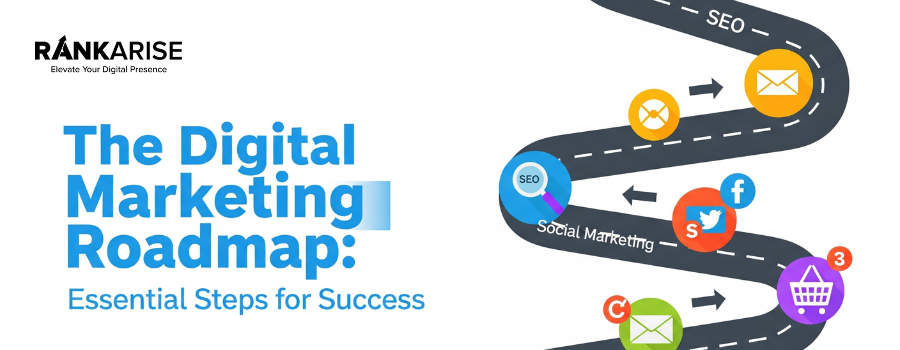In today’s hyperconnected world, digital marketing isn’t optional, it’s the backbone of sustainable business growth. But with so many channels, tools, and strategies available, it’s easy to feel overwhelmed. The key lies in following a roadmap: a step-by-step approach that ensures every effort aligns with your business objectives.
This blog will walk you through the essential stages of building a winning digital marketing roadmap that drives measurable success.
Define Your Business Goals
Every successful marketing journey starts with clarity. Ask yourself:
- Do I want to increase brand awareness?
- Generate qualified leads?
- Improve customer retention?
- Drive e-commerce sales?
Defining goals isn’t just about ambition, it dictates the strategies, platforms, and budget you’ll need. Setting SMART goals (Specific, Measurable, Achievable, Relevant, and Time-bound) ensures your campaigns stay focused and results-driven.
Understand Your Target Audience
Effective marketing speaks directly to the right people. Invest time in audience research to uncover:
- Demographics (age, location, gender)
- Psychographics (interests, values, lifestyle)
- Behavior (purchase history, browsing patterns)
- Pain points (problems you can solve)
Building detailed buyer personas helps you craft personalized marketing that resonates and converts.
Optimize Your Website
Your website is the hub of your digital marketing efforts. An underperforming site means wasted ad spends and lower conversion rates. Focus on:
- SEO-friendly structure for maximum visibility in search engines
- Mobile responsiveness since most users browse via smartphones
- Fast load speeds to reduce bounce rates
- Conversion-focused design with clear CTAs, user-friendly navigation, and compelling content
Think of your website as your 24/7 salesperson, make it trustworthy, functional, and persuasive.
Create Valuable Content
Content is the fuel of digital marketing. It establishes authority, builds trust, and nurtures prospects. Consider a content strategy that includes:
- Blog posts and articles (SEO-driven)
- Videos, reels, and short-form clips (engagement-focused)
- Whitepapers, case studies, and ebooks (lead magnets)
- Social media posts tailored for each platform
The goal isn’t just to publish, it’s to publish with purpose. Your content should solve problems, answer questions, and move people closer to choosing your brand.
Leverage Paid Advertising
While organic efforts build long-term foundations, paid advertising accelerates results. Platforms like Google Ads, Meta Ads, and LinkedIn Ads put your brand in front of qualified audiences immediately.
When running campaigns:
- Define clear objectives (awareness, leads, or sales)
- Monitor key metrics like CTR, CAC, and ROI
- Run A/B tests to optimize ad creatives and landing pages
Done right, paid ads act as a growth booster for your business.
Strengthen Your Social Media Presence
Social platforms are more than posting spaces, they’re relationship hubs. Beyond consistency, success comes from community building:
- Engage with comments and messages
- Share user-generated content
- Participate in trending conversations
- Use targeted campaigns to reach new segments
Social proof builds trust. A strong presence ensures your brand is remembered, not overlooked.
Implement SEO for Long-Term Growth
Search Engine Optimization (SEO) is the foundation of sustainable visibility. While it takes time, ranking well ensures organic traffic that keeps delivering. Best practices include:
- Keyword optimization (on-page and off-page)
- High-quality link building
- Local SEO for region-specific businesses
- Technical SEO audits to improve performance
Think of SEO as planting seeds, consistent effort today yields results for years.
Track, Measure, and Optimize
A roadmap isn’t set in stone, it’s a living strategy. Use analytics tools like Google Analytics, Search Console, and ad dashboards to measure performance. Focus on metrics that matter:
- Conversion rates
- Cost per lead
- Return on ad spend
- Lifetime customer value
Regularly review results and optimize campaigns. The most successful marketers adapt quickly, pivot strategies, and double down on what’s working.
Final Thoughts
Digital marketing success doesn’t happen overnight, it’s a journey. By following this roadmap, setting clear goals, understanding your audience, building a strong website, leveraging content and ads, and continuously tracking performance, you’ll have a clear path to measurable growth.
The digital landscape changes fast, but with the right roadmap, your business will stay ahead.
Frequently Asked Questions (FAQ)
What is a digital marketing roadmap?
A digital marketing roadmap is a step-by-step plan that outlines how a business will use online strategies like SEO, paid ads, content marketing, and social media to achieve its goals. It helps you stay focused, organized, and results-driven.
Why is a digital marketing roadmap important for business success?
Without a roadmap, it’s easy to waste resources on scattered campaigns. A clear digital marketing roadmap ensures every activity, whether SEO, paid ads, or content, contributes toward your business goals and delivers measurable ROI.
What are the first steps in building a digital marketing roadmap?
The first steps include defining SMART business goals, identifying your target audience, and optimizing your website for performance. Once the foundation is set, you can build strategies for content, paid ads, and SEO.
How does SEO fit into a digital marketing roadmap?
SEO is a long-term growth strategy within the roadmap. It ensures your website ranks higher on search engines, driving consistent organic traffic that reduces reliance on paid ads over time.
How do I measure the success of a digital marketing roadmap?
Success can be measured through metrics such as conversion rates, cost per lead, customer acquisition cost, return on ad spend, and lifetime customer value. Regular analysis helps refine and optimize campaigns.
Should small businesses follow a digital marketing roadmap?
Yes, small businesses benefit greatly from a roadmap. It ensures every dollar spent on marketing is aligned with growth goals, providing structure and clarity even with limited budgets.
How often should I update my digital marketing roadmap?
Your roadmap should be reviewed at least quarterly. Since market trends and customer behavior evolve, regular updates keep your strategy relevant and competitive.

